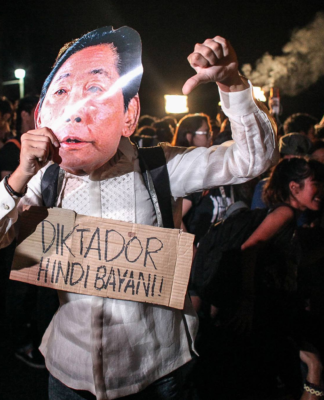THE UNIVERSITY has finally “penetrated” the international circle of leading countries in advanced learning systems by hosting an international conference on educational technology at the Thomas Aquinas Research Complex from May 30 to 31.
The “EDU Quad International 2011,” organized by the Educational Technology Center (Ed-Tech), gathered administrators, educators, and students from the academe and technological industry to discuss issues on online learning and electronic development.
Ed-Tech director Ninia Calaca said international conferences on electronic learning or “e-learning” were usually “locked” in Singapore, Hong Kong and Taiwan, and UST had to wait for three years before EDU Quad was brought to the country.
“UST is the only matured institution when it comes to e-learning, Calaca said. “Wala tayong ka-level [in the Philippines]. Malayo na tayo. Sa atin na nga sila (other schools) nagbe-benchmark.”
Attending international conferences abroad is expensive, so UST decided to host EDU Quad in the country to help Filipino delegates, she added.
With the theme “Education on the cornerstones of Quality, University, Access and Development,” the conference focused on techniques in maximizing technology to enhance student engagement and advance learning.
During parallel sessions, speakers discussed issues relating to international quality standards of online learning, which can be customized to suit the needs of users, whether in teaching, research, or administration.
Other speakers from different universities in the country also shared “e-practices” in their respective schools and talked about possibilities and challenges in the implementation of online learning.
Vice Rector Fr. Pablo Tiong, O.P., said there was a pressing need to keep pace with technological advancements because they play a “crucial role” in the society.
“Technology is at the service of education and the human person,” he said.
According to Zandro Rapadas, president of the University of the Philippines Open University Alumni Foundation, students nowadays are “digital learners.” He encouraged educators “to use technology students love [in order] to create, teach, engage, and reach students more effectively.”
“But online learning could be challenged by educators’ and students’ reluctance and discipline to use technology ‘educationally’,” he said.
Vice Rector for Academic Affairs and Research Clarita Carillo said teachers should not fear that technology may replace them.
“Technology remains [to be] a tool. It should not be seen as a threat to teachers, or at least to the good ones,” she said.
Calaca, meanwhile, said “e-technology” aims to integrate technology into education by making sure that students enjoy what they are doing while making the experience productive.
Ed-Tech aims to “open doors” through the conference to encourage educators to take advantage of the “endless possibilities” of technology,” she said.
Lecturers include professors Daniel Tan from Nanyang Technological University in Singapore, Lilian Vrijmoed from the City University of Hong Kong, Trisha Popov and Susan Stoney from Edith Cowan University in Australia, and Gerrit Bahlman from the Hong Kong Polytechnic University.
Also present were Theresa Foo of Mc-Graw Hill Education Asia, Totie Gob from Acer Inc., a multinational computer technology and electronics corporation, as well as Leslie Wee and Jenn En Yee of software company Blackboard Inc.
Representatives from different national universities and educational and technological organizations also participated.
















